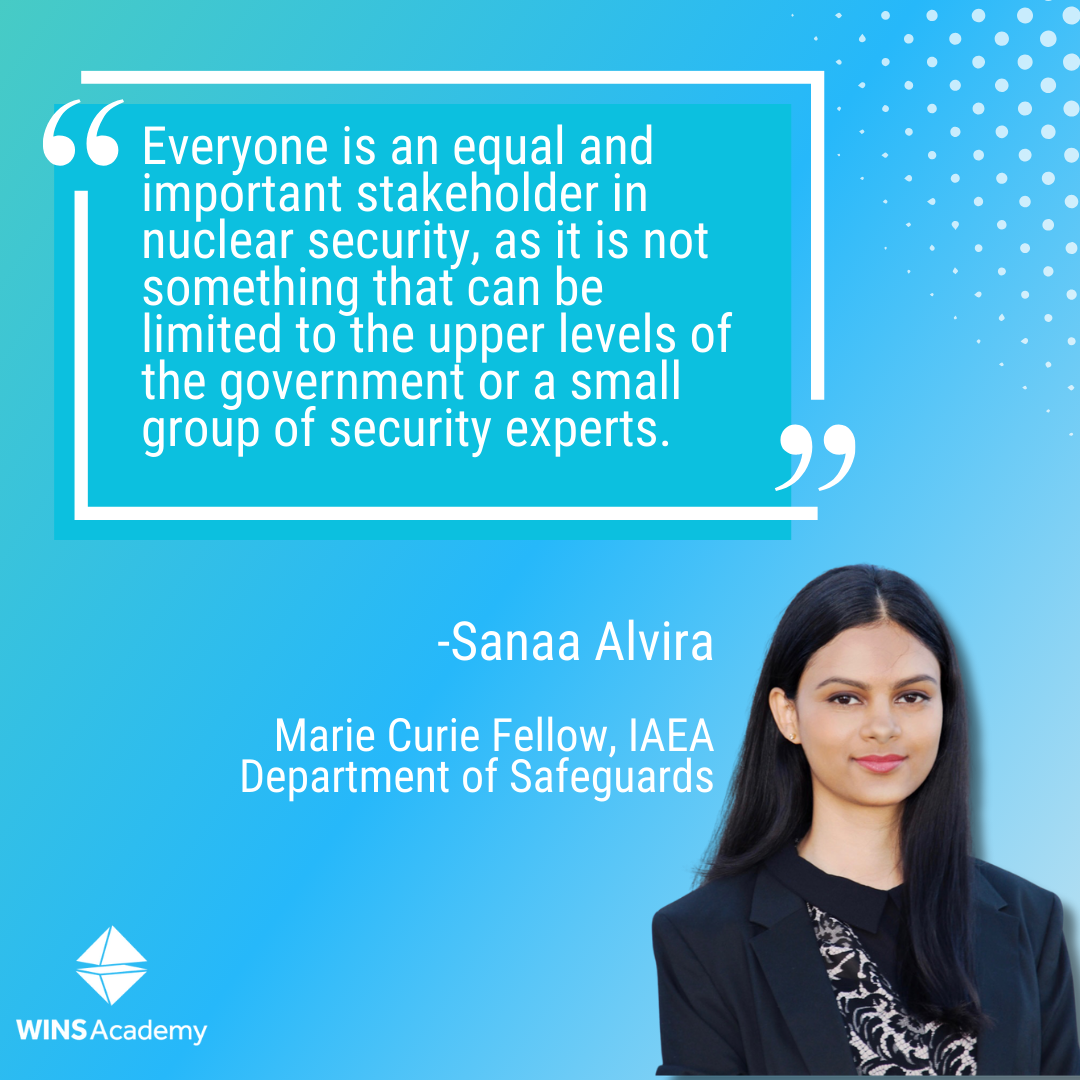Two-time scholarship recipient and Alumni Sanaa Alvira has recently embarked on another WINS Academy learning journey to study Nuclear Security Regulation, which she hopes will provide her with a more holistic understanding during her time as an intern at the IAEA’s Department of Safeguards.
The WINS Academy was my first formal education in the field of nuclear security, specifically, but also more broadly in the nuclear field.
We sat down to speak with Ms Alivra to shed some more light on Ms Alvira’s experience with the WINS Academy and beyond. Her interest in the nuclear field first began when she was studying for a Master’s degree in international relations at the London School of Economics (LSE). She aimed to focus her studies specifically on nuclear politics and non-proliferation and wrote her dissertation on the US-India Nuclear Deal, even though there were no specific courses at LSE regarding nuclear. According to her, “The act of writing my dissertation cemented the idea that I wanted my career to be in the nuclear field.”
After graduating in 2019, Ms Alvira returned to India as the COVID pandemic hit, when she applied for and received her first WINS Academy scholarship. During this time, Ms Alvira studied the Foundation module, with a specialisation in Communicating with Civil Society.
She described this experience by stating, “The WINS Academy was my first formal education in the field of nuclear security, specifically, but also more broadly in the nuclear field.”
The WINS Academy Foundation module provided her with a good understanding of the technical aspects of the nuclear fuel cycle in an easy-to-understand format. Ms Alvira continued by saying, “While there are several online resources, the Foundations module presents all parts of the fuel cycle in a very simple manner without a lot of jargon, so that someone who does not necessarily have a background in nuclear security can easily understand and grasp the information.”
With regards to her specialisation on Communication with Civil Society, Ms Alvira’s biggest takeaway is that “everyone is an equal and important stakeholder in nuclear security, as it is not something that can be limited to the upper levels of the government or a small group of security experts.”
Using what she learned during this course, Ms Alvira penned an article entitled Nuclear Secrecy: A Case for Lifting the Veil, which was published by the Centre for Arms Control and Non-Proliferation, on the significance to keeping the public updated on updates in the nuclear field through responsibly disclosing information.
Everyone is an equal and important stakeholder in nuclear security, as it is not something that can be limited to the upper levels of the government or a small group of security experts.
Following her studies at the WINS Academy, Ms Alvira pursued her second Master’s at the Middlebury Institute to focus on nonproliferation studies. In the meantime, she also received the IAEA’s Marie Curie Scholarship, which helped fund her studies and also facilitated an internship at the IAEA.
During her time as an intern at the IAEA, Ms Alvira is continuing her learning journey at the WINS Academy, which is also funded through an Academy scholarship.
With regards to the current WINS module she is undertaking, Nuclear Security Regulations, Ms Alvira said, “I hope to deepen my understanding of the interplay between safety, security and safeguards within the context of nuclear energy. I would further like to comprehend how regulatory bodies integrate these three pillars in enabling the peaceful use of nuclear energy.”
As a second-time recipient of a WINS Academy scholarship, Ms Alvira found the process of applying relatively quick and simple when compared with other application processes.
She continued by saying, “It is not a long application process in which you have to write a long motivation letter or provide reference letters. Once you become a WINS member, 50% of the work in applying is already done, and all you have to do is answer a couple more questions on the WINS website about your background on a simple form and send it in.”
